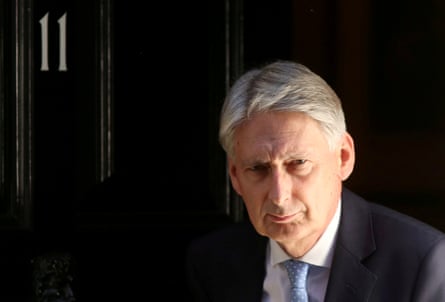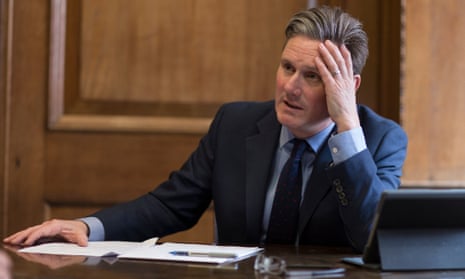Theresa May and the government would face a race against time to pass a slew of new laws, or risk creating an “unsustainable legal vacuum”, if Britain plunged out of the EU without a deal, Labour’s Keir Starmer has warned.
Dominic Raab insisted last week that the government had the legislation in place to cope, if Britain is forced to leave in March 2019 without a withdrawal agreement.
“Our laws will be on the statute book, the staff will be in place, the teams will be in post and our institutions will be ready for Brexit – deal, or no deal,” the Brexit secretary said.
But Labour’s analysis suggests new legislation would have to be passed hastily in four key policy areas:
- EU citizens’ rights.
- Immigration rules for EU travellers entering Britain.
- Criminals held under the European arrest warrant.
- The Irish border.
The government has long promised an immigration bill – but has not yet even published a white paper.
The home affairs select committee warned recently that “if there’s no deal, [the immigration system] is going to be completely chaotic as no one will know what the arrangements will be until the very last minute and there is going to be no time for anyone to plan at all”.
Several new regulators or other public bodies would also have to be created, including in medicines and aviation, Labour claims. The withdrawal bill gives ministers some powers to do this, but they are tightly curtailed.
Starmer described last week’s release of 24 technical notices on how the government is preparing for a no deal as a “poorly executed PR stunt designed to convince Tory MPs to back the prime minister’s discredited Chequers proposal”.
He said the government has “barely scratched the surface” of what would need to be done to prepare the UK for a no-deal scenario, and there was a serious risk of an “unsustainable legal vacuum”.
The withdrawal agreement with the EU is intended to allow for most existing laws and institutions to remain in place during a transitional period of almost two years, while the government negotiates the details of its future trading relationship with the EU.

But if talks break down – or MPs reject the deal – it is unclear what would happen next. Given the March deadline created by triggering article 50, one possibility is that Britain could end up leaving without any agreement in place.
Joe Owen, of thinktank the Institute for Government, said that in theory parliament could pass legislation rapidly in an emergency; but it is unclear whether MPs would cooperate. “Parliament could hold it up, if it wanted to,” he said. “Whichever avenue you go down, there’s going to be a bunfight in parliament.”
Hardline Brexiters on the Conservative backbenches are keen to play down the risks of a no-deal outcome, with some believing it would be preferable to the Chequers position, with its “common rulebook” and single market for goods.
They reacted angrily to chancellor Philip Hammond’s decision to release a letter last week highlighting Treasury forecasts that the hit to GDP under a no-deal scenario could be £80bn.
Former Brexit secretary David Davis used an article in the Sun on Sunday to urge the public to “ignore the misery merchants of the Treasury, stop fearing things that will never happen, and start planning for the real opportunities that this great country can grasp when it sets its mind to it”.
With another week to go before MPs return to Westminster from their long summer recess, campaign groups on both sides of the Brexit divide are gearing up to try to influence the outcome of what promises to be a tense six months.
People’s Vote, a cross-party pressure group that hopes to secure a referendum on the final Brexit deal, is urging its members not to attack the Labour leadership, as they seek to secure a vote at the party’s conference on the issue.
In a leaked memo seen by the Guardian, its director of communications, Tom Baldwin, says: “This campaign is not about Jeremy Corbyn and we must not – will not – use it to damage or undermine the party’s leadership or attack them personally.”
Baldwin also seeks to shut down recent rumours that the People’s Vote campaign could be used as a vehicle for a breakaway group of Labour MPs to form a new political party.
Q&AWhat is a hard Brexit?
Show
A hard Brexit would take Britain out of the EU’s single market and customs union and ends its obligations to respect the four freedoms, make big EU budget payments and accept the jurisdiction of the ECJ: what Brexiters mean by “taking back control” of Britain’s borders, laws and money. It would mean a return of trade tariffs, depending on what (if any) FTA was agreed. See our full Brexit phrasebook.
“The looming prospect of a botched Brexit is too important for anyone to use it for the pursuit of any other political objective,” he says.
Labour has edged closer to backing a referendum on the final deal, if parliament rejects it – though the leadership would prefer the opportunity to challenge May in a general election.
A government spokesperson said on Sunday night: “We do not want or expect a no-deal scenario and remain confident we will agree a mutually advantageous deal with the EU. As [Raab] said last week, we are continuing to put the legislative building blocks in place to deliver our exit.
“The EU Withdrawal Act is a crucial piece of legislation that will ensure there is a functioning statute book on exit day, irrespective of the outcome of negotiations.”
Meanwhile Leave Means Leave, which counts Nigel Farage among its prominent backers, has set itself a £5m fundraising target in a bid to persuade May and her cabinet to ditch the Chequers position and press ahead with a “clean Brexit”.
“Leave Means Leave have the fight of our lives ahead of us. We are the David to the establishment’s Goliath but we are committed to winning this fight,” said its chair, John Longworth.
The government’s technical notices on a no-deal Brexit – the first batch of more than 80 expected to be released before the end of next month – warned that tariffs could be imposed on UK exports, credit card payments to the EU would become more expensive and Brits living abroad could lose access to payments from their bank accounts.
Raab stressed that a no-deal Brexit was not the government’s preferred outcome and said: The vast majority, roughly 80%, of the withdrawal agreement has now been agreed.”
However, ramping up preparations for a no-deal outcome was one aspect of the agreement reached in Chequers in July. May has scheduled an extra cabinet meeting, on 13 September, to discuss the government’s readiness, with some ministers complaining not enough is being done.
